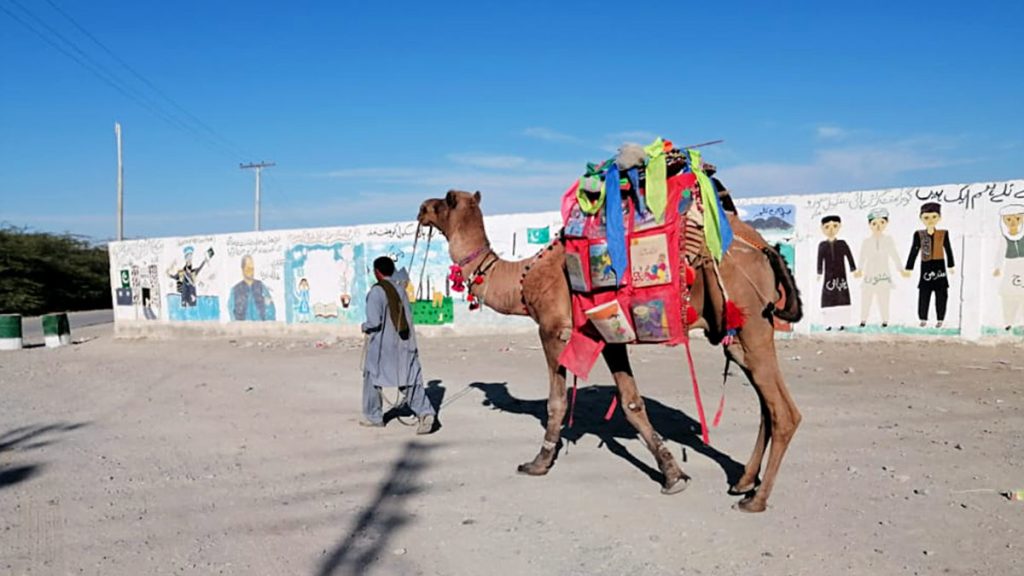KARACHI, Pakistan — When Muhammad Murad was offered a job carrying books on his 12-year-old camel to nearby villages, he had no idea that he would become so popular with children. Many of the youngsters wait for “Murad Chacha” every week, so they can read their choice of a storybook.
Murad, who is 41, lives in the remote district of Balochistan. He has owned a camel since he was 15. Every day he and his camel would head to the mountains to collect wood to sell in the nearby villages at a low price.
But after sisters Zobeida Jalal and Raheema Jalal approached him for the “Camel Library” cause, his life changed entirely.
The organizations that initiated the project gave Murad’s camel the name Roshan, which means the one who enlightens the path for others.
“I am not a literate person. I have never gone to any school, but I feel very proud that an illiterate person like me has become a source for education for children who want to learn,” Murad told Zenger News.
He travels three days a week to three villages in the district of Kech.
“Kech district faces a number of education related challenges in terms of access and quality,” according to the Kech District Education Plan.
“District officials have a number of limitations as per the structure of education, in ensuring quality of education. Among others, they do not control the quality of curriculum, textbooks, teacher recruitment and teacher training,” the education plan states.

In addition to access to and quality of education, the district also faces major challengers related to poverty and cultural constraints.
With the establishment of the Camel Library, not only did Murad’s economic situation improve, but he is also able to send five of his children to school.
“I have eight children. I could not send my two elder ones to school, but the rest of them are now studying,” he said. “I am glad I can send them to school now. I used to earn Rs 6000 ($82) per month with wood selling, but now I easily make Rs 12,000 ($164) per month and enjoy my work.”
Murad said that living in a remote village all his life, he had no idea about the importance of education. Today, when he sees children’s eagerness to learn, in his village and in nearby villages, he feels sad and wishes that he had known how important education is for a person.
“Maybe if I were educated, I would have helped children in not only bringing books to them, but also guiding them how to read and learn,” he said.
The children in the villages where he delivers books ask Murad when he will return, which he says makes him feel happy.
Hanifa Abdul Samad, a Zobeida Jalal High School teacher, accompanies Murad and Roshan on their mobile library expeditions. Hanifa said they have to walk about four miles to reach the nearby villages.
“I help the children in selecting books according to their age. When we arrive, children are always waiting for us anxiously. Some of them run to us and gather around Roshan,” she said.
The mobile library has a positive impact on children’s learning, she said.
“Previously, they only knew Balochi, the regional language of Pakistan, but now they are not only learning Urdu and English, but also try to communicate with each other, which is an excellent sign.”
Hanifa said that while the initiative is beneficial for the children, there have been a lot of challenges in implementing it. Talking to Zenger News via a broken mobile connection, she said that sometimes she has to travel six to seven miles to send updates and photos to the team in Lahore.
Amna Hassan Kazmi, program manager at the Alif Laila Book Bus Society (ALBBS), one of the initiators of the project, said that one camel carries around 250 books at a time. She said the children receive other items as well.

“Children are given flashcards, art and craft kits along with the storybooks. ALBBS trains the teachers who accompany Murad to help children do the activities with the resource material,” said Amna.
“Hanifa walks miles to WhatsApp us the pictures and to take instruction,” Amna said. “The internet is only available in a few spots. That is why providing them the resources, books and training to teachers in the villages was an incredibly challenging task for their organization.”
ALBBS has been bringing the “magic of books and literature” to children in the country for 36 years. The Camel Library is one of the mobile library projects in collaboration with the Female Education Trust, run by Raheema Jalal and Zobeida Jalal, minister for defense production, who is from Balochistan.
“The fascinating thing about using the camel was that it is eco-friendly, it moves on its own, and no diesel or petrol is used to make it move,” Basarat Kazim, president of ALBBS, told Zenger News. “As one of our projects is animal rights, we want children to not only befriend books, but also befriend animals and respect and be kind towards them.
“We want children to feel an affinity with animals, and we thought that it was a lovely way of doing that. Because in this, the camel is the giver, and it is bringing books to them. We also feel that the camel is a gentle and lovely animal,” she said.
Basarat said that out of all her mobile libraries initiatives, which include the popular book bus, Storyteller (Daastangau) bus, rickshaw library, and bike library, the Camel Library is the most popular.
“Murad is so happy and confident now; his life and attitude has changed, and he says that seeing children learning makes [him] very happy,” she said.
(Edited by Raza Hamdani and Judith Isacoff)
The post ‘Camel Library’ Changes Lives In Remote Pakistani Villages appeared first on Zenger News.



